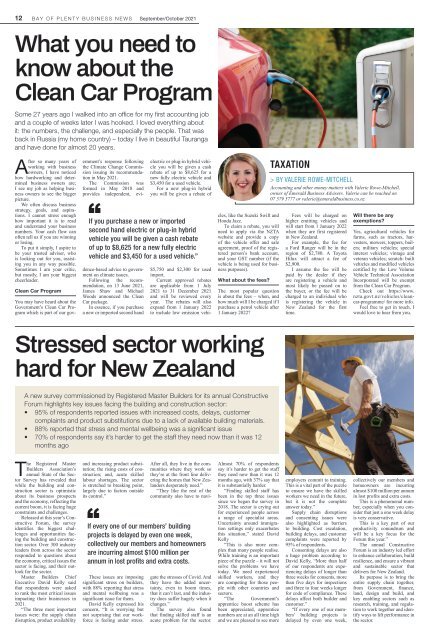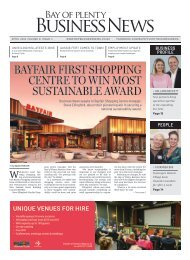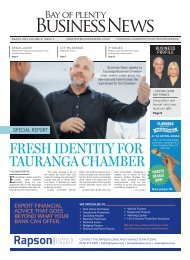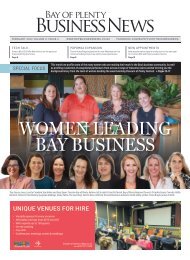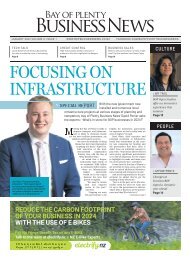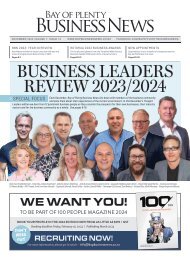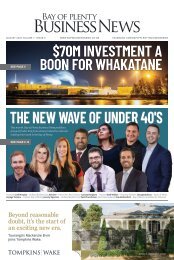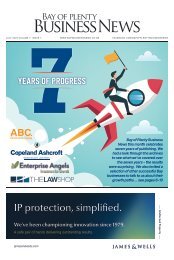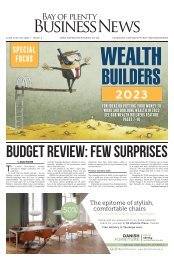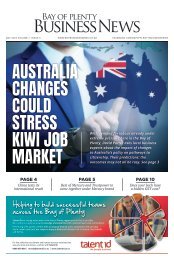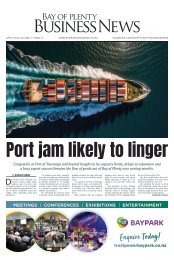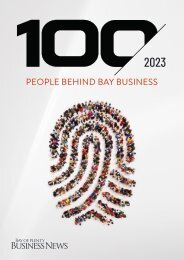September/October 2021 - Bay of Plenty Business News
From mid-2016 Bay of Plenty businesses have a new voice, Bay of Plenty Business News. This new publication reflects the region’s growth and importance as part of the wider central North Island economy.
From mid-2016 Bay of Plenty businesses have a new voice, Bay of Plenty Business News. This new publication reflects the region’s growth and importance as part of the wider central North Island economy.
Create successful ePaper yourself
Turn your PDF publications into a flip-book with our unique Google optimized e-Paper software.
12 BAY OF PLENTY BUSINESS NEWS <strong>September</strong>/<strong>October</strong> <strong>2021</strong><br />
What you need to<br />
know about the<br />
Clean Car Program<br />
Some 27 years ago I walked into an <strong>of</strong>fice for my first accounting job<br />
and a couple <strong>of</strong> weeks later I was hooked. I loved everything about<br />
it: the numbers, the challenge, and especially the people. That was<br />
back in Russia (my home country) – today I live in beautiful Tauranga<br />
and have done for almost 20 years.<br />
After so many years <strong>of</strong><br />
working with business<br />
owners, I have noticed<br />
how hardworking and determined<br />
business owners are;<br />
I see my job as helping business<br />
owners to see the bigger<br />
picture.<br />
We <strong>of</strong>ten discuss business<br />
strategy, goals, and aspirations.<br />
I cannot stress enough<br />
how important it is to read<br />
and understand your business<br />
numbers. Your cash flow can<br />
<strong>of</strong>ten tell us if you are winning<br />
or losing.<br />
To put it simply, I aspire to<br />
be your trusted adviser, who<br />
is looking out for you, assisting<br />
you in any way possible.<br />
Sometimes I am your critic,<br />
but mostly, I am your biggest<br />
cheerleader.<br />
Clean Car Program<br />
You may have heard about the<br />
Government’s Clean Car Program<br />
which is part <strong>of</strong> our government’s<br />
response following<br />
the Climate Change Commission<br />
issuing its recommendation<br />
in May <strong>2021</strong>.<br />
The Commission was<br />
formed in May 2018 and<br />
provides independent, evidence-based<br />
advice to government<br />
on climate issues.<br />
Following the recommendation,<br />
on 13 June <strong>2021</strong>,<br />
James Shaw and Michael<br />
Woods announced the Clean<br />
Car package.<br />
In essence, if you purchase<br />
a new or imported second hand<br />
electric or plug-in hybrid vehicle<br />
you will be given a cash<br />
rebate <strong>of</strong> up to $8,625 for a<br />
new fully electric vehicle and<br />
$3,450 for a used vehicle.<br />
For a new plug-in hybrid<br />
you will be given a rebate <strong>of</strong><br />
If you purchase a new or imported<br />
second hand electric or plug-in hybrid<br />
vehicle you will be given a cash rebate<br />
<strong>of</strong> up to $8,625 for a new fully electric<br />
vehicle and $3,450 for a used vehicle.”<br />
$5,750 and $2,300 for used<br />
import.<br />
Current approved rebates<br />
are applicable from 1 July<br />
<strong>2021</strong> to 31 December <strong>2021</strong><br />
and will be reviewed every<br />
year. The rebates will also<br />
expand from 1 January 2022<br />
to include low emission vehicles,<br />
like the Suzuki Swift and<br />
Honda Jazz.<br />
To claim a rebate, you will<br />
need to apply via the NZTA<br />
website and provide a copy<br />
<strong>of</strong> the vehicle <strong>of</strong>fer and sale<br />
agreement, pro<strong>of</strong> <strong>of</strong> the registered<br />
person’s bank account,<br />
and your GST number (if the<br />
vehicle is being used for business<br />
purposes).<br />
What about the fees?<br />
The most popular question<br />
is about the fees – when, and<br />
how much will I be charged if I<br />
purchase a petrol vehicle after<br />
1 January 2022?<br />
TAXATION<br />
> BY VALERIE ROWE-MITCHELL<br />
Accounting and other money matters with Valerie Rowe-Mitchell,<br />
owner <strong>of</strong> Emerald <strong>Business</strong> Advisers. Valerie can be reached on<br />
07 579 5777 or valerie@emeraldbusiness.co.nz<br />
Fees will be charged on<br />
higher emitting vehicles and<br />
will start from 1 January 2022<br />
when they are first registered<br />
in New Zealand.<br />
For example, the fee for<br />
a Ford Ranger will be in the<br />
region <strong>of</strong> $2,780. A Toyota<br />
Hilux will attract a fee <strong>of</strong><br />
$2,900.<br />
I assume the fee will be<br />
paid by the dealer if they<br />
are registering a vehicle and<br />
most likely be passed on to<br />
the buyer, or the fee will be<br />
charged to an individual who<br />
is registering the vehicle in<br />
New Zealand for the first<br />
time.<br />
Will there be any<br />
exemptions?<br />
Yes, agricultural vehicles for<br />
farms, such as tractors, harvesters,<br />
mowers, toppers, bailers;<br />
military vehicles; special<br />
interest vehicles; vintage and<br />
veteran vehicles; scratch- built<br />
vehicles and modified vehicles<br />
certified by the Low Volume<br />
Vehicle Technical Association<br />
Incorporated will be exempt<br />
from the Clean Car Program.<br />
Check out https://www.<br />
nzta.govt.nz/vehicles/cleancar-programme/<br />
for more info.<br />
Feel free to get in touch, I<br />
would love to hear from you.<br />
Stressed sector working<br />
hard for New Zealand<br />
A new survey commissioned by Registered Master Builders for its annual Constructive<br />
Forum highlights key issues facing the building and construction sector:<br />
• 95% <strong>of</strong> respondents reported issues with increased costs, delays, customer<br />
complaints and product substitutions due to a lack <strong>of</strong> available building materials.<br />
• 88% reported that stress and mental wellbeing was a significant issue<br />
• 70% <strong>of</strong> respondents say it’s harder to get the staff they need now than it was 12<br />
months ago<br />
The Registered Master<br />
Builders Association’s<br />
annual State <strong>of</strong> the Sector<br />
Survey has revealed that<br />
while the building and construction<br />
sector is optimistic<br />
about its business prospects<br />
and the economy, reflecting the<br />
current boom, it is facing huge<br />
constraints and challenges.<br />
Released at this year’s Constructive<br />
Forum, the survey<br />
identifies the biggest challenges<br />
and opportunities facing<br />
the building and construction<br />
sector. Over 300 industry<br />
leaders from across the sector<br />
responded to questions about<br />
the economy, critical issues the<br />
sector is facing, and their outlook<br />
for the sector.<br />
Master Builders Chief<br />
Executive David Kelly said<br />
that respondents were asked<br />
to rank the most critical issues<br />
impacting their businesses in<br />
<strong>2021</strong>.<br />
“The three most important<br />
issues were: the supply chain<br />
disruption, product availability<br />
and increasing product substitution;<br />
the rising costs <strong>of</strong> construction;<br />
and, acute skilled<br />
labour shortages. The sector<br />
is stretched to breaking point,<br />
largely due to factors outside<br />
its control.”<br />
These issues are imposing<br />
significant stress on builders,<br />
with 88% reporting that stress<br />
and mental wellbeing was a<br />
significant issue for them.<br />
David Kelly expressed his<br />
concern, “It is worrying but<br />
not surprising that our workforce<br />
is feeling under stress.<br />
If every one <strong>of</strong> our members’ building<br />
projects is delayed by even one week,<br />
collectively our members and homeowners<br />
are incurring almost $100 million per<br />
annum in lost pr<strong>of</strong>its and extra costs.<br />
After all, they live in the communities<br />
where they work so<br />
they’re at the front line delivering<br />
the homes that New Zealanders<br />
desperately need.”<br />
“They like the rest <strong>of</strong> the<br />
community also have to navigate<br />
the stresses <strong>of</strong> Covid. And<br />
they have the added uncertainty,<br />
even in boom times,<br />
that it can’t last, and the industry<br />
does suffer hugely when it<br />
changes.”<br />
The survey also found<br />
that finding skilled staff is an<br />
acute problem for the sector.<br />
Almost 70% <strong>of</strong> respondents<br />
say it’s harder to get the staff<br />
they need now than it was 12<br />
months ago, with 37% say that<br />
it is substantially harder.<br />
“Finding skilled staff has<br />
been in the top three issues<br />
since we began the survey in<br />
2018. The sector is crying out<br />
for experienced people across<br />
a range <strong>of</strong> specialist areas.<br />
Uncertainty around immigration<br />
settings only exacerbates<br />
this situation,” stated David<br />
Kelly<br />
“This is also more complex<br />
than many people realise.<br />
While training is an important<br />
piece <strong>of</strong> the puzzle – it will not<br />
solve the problems we have<br />
today. We need experienced<br />
skilled workers, and they<br />
are competing for those people<br />
with other countries and<br />
sectors.<br />
“The Government’s<br />
apprentice boost scheme has<br />
been appreciated, apprentice<br />
numbers are at an all time high<br />
and we are pleased to see more<br />
employers commit to training.<br />
This is a vital part <strong>of</strong> the puzzle<br />
to ensure we have the skilled<br />
workers we need in the future,<br />
but it is not the complete<br />
answer today.”<br />
Supply chain disruptions<br />
and consenting issues were<br />
also highlighted as barriers<br />
to building. Cost escalation,<br />
building delays, and customer<br />
complaints were reported by<br />
95% <strong>of</strong> respondents.<br />
Consenting delays are also<br />
a huge problem according to<br />
David Kelly, “More than half<br />
<strong>of</strong> our respondents are experiencing<br />
delays <strong>of</strong> longer than<br />
three weeks for consents, more<br />
than five days for inspections<br />
and three to four weeks longer<br />
for code <strong>of</strong> compliance. These<br />
delays affect both builder and<br />
customer.”<br />
“If every one <strong>of</strong> our members’<br />
building projects is<br />
delayed by even one week,<br />
collectively our members and<br />
homeowners are incurring<br />
almost $100 million per annum<br />
in lost pr<strong>of</strong>its and extra costs.<br />
This is a phenomenal number,<br />
especially when you consider<br />
that just a one week delay<br />
is very conservative.<br />
This is a key part <strong>of</strong> our<br />
productivity conundrum and<br />
will be a key focus for the<br />
Forum this year.”<br />
The annual Constructive<br />
Forum is an industry led effort<br />
to enhance collaboration, build<br />
resilience, and ensure a vibrant<br />
and sustainable sector that<br />
delivers for New Zealand.<br />
Its purpose is to bring the<br />
entire supply chain together,<br />
from Government, finance,<br />
land, design and build, and<br />
key enabling sectors such as<br />
research, training, and regulation<br />
to work together and identify<br />
ways to lift performance in<br />
the sector.


